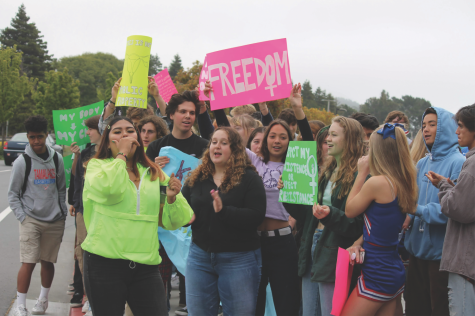Student-led walkout protests recent abortion restrictions
Jun 10, 2019
Sophomore Grace Newman led a women’s rights walkout to protest recent anti-abortion legislation in front of the arches on Friday, May 31, during fifth period. The walkout, made up of about 100 students, began at 8:20 a.m. and ended at 8:45 a.m.

The protest was in response to recent abortion restrictions across the country. “Heartbeat bills” which ban abortion six weeks into the pregnancy or roughly when a fetal heartbeat can first be detected, have passed in Georgia, Mississippi, and Louisiana within the past year.
“People were talking about the things that are going on in other states regarding abortion bans and I just think it’s so important that women and men here understand that just because we’re not directly being affected by the laws that are happening right now, that doesn’t mean we don’t have a part in making a difference,” Newman said. “[It] doesn’t mean we don’t need to stand in solidarity with women all over the world whose rights are being affected because we are all part of the same community.”
Sophomores Nancy Hoang and Jake Cohen helped to lead chants for the crowd. “Us females, we know this is a problem so why would we just sit back and let these people makes these decisions?… Why do [they] think we’re obligated to be quiet because it isn’t ‘lady-like’, No! I don’t care if its ladylike or not. I’m still gonna yell, I’m still gonna fight. They can’t do anything about it because at the end of the day, it’s our bodies and our choice,” Hoang said.
Newman hopes to create a club on campus to continue the conversation regarding women’s rights. “I think it’s important just to spread the message that it’s our generation’s job to make a difference in office and we need to vote these people out. We need to fight back. There are no set plans yet, but in the future I want to start a group to empower girls and fight for [the] rights of those that don’t have the basic rights we do,” Newman said.




TJ Meagher ♦ Jun 12, 2019 at 5:32 pm
There are three excellent places to find the very best reasoning on this topic. Those include, most relevantly, from USSC Justice Sandra Day O’Connor of June 1992 in Planned Parenthood vs Casey. You can find the written argument at 505 US 833. One can even hear the oral arguments made at the Supreme Court here: https://www.oyez.org/cases/1991/91-744.
Prior to “Casey” the leading thinking on this topic was found in Webster vs Reproductive Health Services in an opinion authored by Chief Justice Rehnquist of July 1989. The opinion in that case can be found at citation USSC 492 US 490 and the oral argument can be heard here: https://www.oyez.org/cases/1988/88-605.
The opinion in the case of “Roe vs Wade” offered by USSC Justice Blackmun, (a Richard Nixon appointee), was issued in January 1973 and is superseded now by “Casey” and “Webster”. One can hear both oral arguments (it was argued twice) here: https://www.oyez.org/cases/1971/70-18.
One can lead the pack by reading at least some of this material. However, most commenters might be surprised to read parts of Blackmun’s important decision, which includes from page 153 to 154 in Roe this: [A]ppellant and some… argue that the woman’s right is absolute and that she is entitled to terminate her pregnancy at whatever time, in whatever way, and for whatever reason she alone chooses. With this we do not agree. Appellant’s arguments that Texas either has no valid interest at all in regulating the abortion decision, or no interest strong enough to support any limitation upon the woman’s sole determination, are unpersuasive. The Court’s decisions recognizing a right of privacy also acknowledge that some state regulation in areas protected by that right is appropriate. As noted above, a State may properly assert important interests in safeguarding health, in maintaining medical standards, and in protecting potential life. At some point in pregnancy, these respective interests become sufficiently compelling to sustain regulation of the factors that govern the abortion decision. The privacy right involved, therefore, cannot be said to be absolute. In fact, it is not clear to us that the claim asserted by some amici that one has an unlimited right to do with one’s body as one pleases bears a close relationship to the right of privacy previously articulated in the Court’s decisions. The Court has refused to recognize an unlimited right of this kind in the past. Jacobson v. Massachusetts, 197 U. S. 11 (1905) (vaccination); Buck v. Bell, 274 U. S. 200 (1927) ( sterilization).